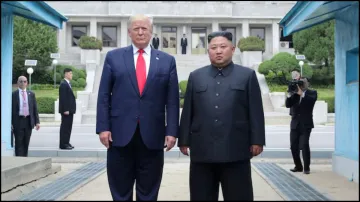Seoul: A former high-ranking North Korean diplomat, who defected to the South last year, said Pyongyang wants to re-open nuclear talks with the United States if Republican candidate Donald Trump is re-elected after the November elections and is working on a new negotiating strategy. These comments mark a change in the red-hot tensions between North Korea and the US amid warnings of armed confrontation.
Ri Il Kyu, a senior North Korean diplomat based in Cuba, defected with his wife and child to South Korea in November, over disillusionment with the regime and unfair evaluation of his work. In his first interview with international media, Ri said North Korea has set Russia, the US and Japan as its top foreign policy priorities for this year and beyond.
He told Reuters that while North Korea is bolstering relations with Russia, it is also keen to re-open nuclear negotiations if Trump, who engaged in both fiery brinkmanship and unprecedented diplomacy with North Korea during his previous term, won re-election. North Korea is aiming for lifting of sanctions on its weapons programmes, removing its designation as a state sponsor of terrorism and eliciting economic aid.
What's in it for Pyongyang?
By forging closer ties with Russia, North Korea received help with its missile technology and economy. However, a bigger benefit could be to block additional sanctions and undercut existing ones, Ri said, adding it would raise Pyongyang's bargaining power against Washington.
"The Russians got their own hands dirty by engaging in illicit transactions and, thanks to that, North Korea no longer needs to rely on the US to lift sanctions, which essentially means they stripped the US of one key bargaining chip," he said. North Korean leader Kim Jong Un is also seeking to hold a summit with Japan, aiming to get economic assistance in return for concessions on Japanese nationals abducted by Pyongyang in the 1970s and 80s, which has impeded their relations, Ri said.
Tokyo believes 17 of its citizens were abducted, five of whom returned to Japan in 2002. Pyongyang sees the issue as settled, having admitted to kidnapping 13 Japanese nationals and saying those unaccounted for had either died or their whereabouts were unknown. Ri said Kim would be willing to change that position, established under his father Kim Jong Il, in order to obtain economic support.
Trump-Kim Summit
Marking a watershed moment, Trump and Kim met at a 2019 summit in Vietnam with the goal of building relations and denuclearisation. However, the talks collapsed when Trump walked away because of unacceptable North Korean demands. Pyongyang insisted that it only sought a partial lifting of sanctions "related to people's livelihoods and unrelated to military sanctions".
North Korean state media KCNA said Kim and Trump had a constructive and sincere exchange of views and decided to continue productive talks, without mentioning that the talks ended abruptly with no agreement reached. Kim expressed gratitude to Trump for travelling so far and actively putting in efforts to get results.
The COVID-19 lockdown deepened hardships at home and for those stationed overseas, with most telephone lines to Pyongyang cut to prevent any information from spreading in the outside world, Ri said. Financial troubles have also forced North Korea to shut down a dozen of its 54 diplomatic missions.
(with inputs from Reuters)
Latest World News
